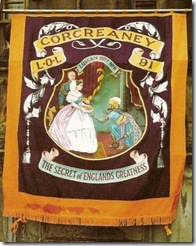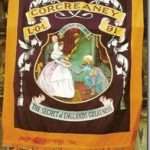God is not an English gentleman
“God could not have been behind the Big Bang,” wrote the eleven year old, “the Big Bang was an explosion and God would be more civil.” The picture of God as a good mannered, avuncular English gentleman seemed to be hovering somewhere in the background.
The eleven year old would not be the first to regard God as quintessentially English. “Cry God for England, Harry and Saint George!” wrote Shakespeare in Henry V. Of course, God must have been on the side of the English, didn’t they win?
One wonders how seriously William Shakespeare took such lines, did he really think God was an Englishman? Probably not, this is the same writer who introduces humour into the tragedy of Hamlet with the dialogue of the between the clown-gravedigger and Hamlet, who the gravedigger thinks has gone to England.
HAMLET
Ay, marry, why was he sent into England?
First Clown
Why, because he was mad: he shall recover his wits
there; or, if he do not, it’s no great matter there.
HAMLET
Why?
First Clown
‘Twill, a not be seen in him there; there the men
are as mad as he.
Shakespeare could take his patriotism with a dose of realism; the men in the army of Henry V probably did believe God was fighting for them, but anyone who thought about things in times when the whole of Europe was part of Christendom would have realized that God couldn’t be on all sides simultaneously. Yet the belief persisted down through the centuries that God must be on one’s own side and because the English tended to win more often than lost, they became convinced that there must be divine intervention.
 The belief that God and England went hand reached its peak in the 19th Century with the British Empire extending around the world. The Bible was seen as the secret of England’s greatness – it was convenient for politicians who could claim divine sanction for almost anything they did and it was convenient for churchmen who were influential because of their associations with a powerful British Establishment. In Ireland the Orange Order believed British rule to be part of the divine scheme of things, England was great because of its faithfulness to Scripture.
The belief that God and England went hand reached its peak in the 19th Century with the British Empire extending around the world. The Bible was seen as the secret of England’s greatness – it was convenient for politicians who could claim divine sanction for almost anything they did and it was convenient for churchmen who were influential because of their associations with a powerful British Establishment. In Ireland the Orange Order believed British rule to be part of the divine scheme of things, England was great because of its faithfulness to Scripture.
Did people really believe that God sanctioned English power? How did the Scots feel about God supporting the massacre of highlanders at Culloden Moor in 1746? How did the Irish feel about an English government that presided over the Great Famine of 1745-1752? How many would have cried “God for England, Harry and Saint George?”
Whether or not God was behind the Big Bang, he was definitely not an English gentleman.


Comments
God is not an English gentleman — No Comments
HTML tags allowed in your comment: <a href="" title=""> <abbr title=""> <acronym title=""> <b> <blockquote cite=""> <cite> <code> <del datetime=""> <em> <i> <q cite=""> <s> <strike> <strong>